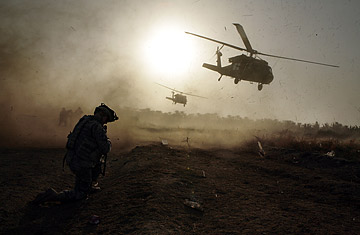
This column was almost pre-empted by news of the daring “kill or capture” raid by U.S. Navy SEALs against Osama bin Laden. But, as the Raymond Davis case took time to resolve, the tough and obvious political and strategic answers to what Pakistan knew or did not know about the now deceased al-Qaida leader’s whereabouts will likewise require patience.
A rush to judgment, for or against, under any circumstances, is ill-advised given the complicated, crucial and critical nature of the U.S.-Pakistan relationship.
As a first cut however, the U.S. military surely didn’t forget the failed Desert One raid of 1980 to free U.S. personnel kidnapped by Iran when the government allowed so-called students to overrun the embassy in Tehran.
This operation to take bin Laden down was planned flawlessly and anticipated the possibility of at least one of the helicopters breaking down that wasn’t the case 31 years ago.
Bermuda sits 800 miles off the United States’ Carolina coast — a tiny coral jewel with a population of about 65,000, two-thirds of whom are non-white. Many times that number of tourists, the greater majority being American, visit each year. Of the smaller slice, a large number are Canadians, Britons and Europeans.
Among these non-U.S. visitors, for as many years as we have traveled to Bermuda, American foreign policy has been a source of much and often highly vocal criticism.
After September 11th and then the invasion of Iraq, our foreign friends — and this is obviously a small and thus anecdotal sample — were hugely critical. Appreciating the passions after the Twin Towers collapsed, virtually none of these visitors could understand how the United States virtually folded its tent to focus on Iraq.
After the lightning military campaign to unseat Saddam Hussein, these same friends found it inconceivable that the United States had no plan for dealing with what seemed an obvious mess once the dictator was gone. Even after the “surge” in 2007 reversed the insurgency and led to a greater measure of law and order, incredulity still reigned among this group.
Of course, at the same time, Afghanistan continued to deteriorate, raising further negative commentary.
U.S. President Barack Obama, of course, was going to be different. Yet, he too succumbed to similar errors in ignoring history. While President George W. Bush was assailed for being the “decider” and willing to make tough and quick decisions, in 2009 and the long study on what to do in Afghanistan, Obama become the “ditherer.” The point was that neither deciding nor dithering seemed to work even though the Obama team inherited a very weak hand.
The Arab Spring, perhaps better called the Arab Winter of Discontent, triggered another round of unhappy reactions among the European visitors to this tiny and lovely island. What was American policy? After dumping some allies of many decades such as former President Hosni Mubarak of Egypt, how was it possible to support other allies with human rights abuses just as bad notably in Saudi Arabia? Then came Libya.
Egged on by the Arab League, the United Nations and then the French and British decision to establish a no-fly zone over Libya as part of “all necessary measures” to protect innocent civilians, the Obama administration dived in.
But had no one read even recent history from the last administration? What was the exit strategy and where was the plan for the post-conflict reconstruction of Libya? There was none.
The coup de grace was the entrance of Donald Trump onto the presidential stage.
Here was a guy who would take on Libya and use its oil to pay for the operation; threaten Saudi Arabia and the Organization of Petroleum Exporting Countries to lower oil prices or else; and impose 25 percent tariffs on Chinese exports.
For Trump, history must have started around 2009 or 2010 because his mercantilist attitude of grabbing resources, bankrupted the economies of Spain and Portugal bent on exploiting gold and silver from the new world 600 years ago.
Punitive measures such as those imposed on Germany in 1919 at Versailles produced Hitler and the Nazis. And, for openers, Smoot-Hawley and other tariffs helped precipitate the Great Depression of the late 1920’s.
The military — an apolitical professional organization learned the lessons of Desert One well. Hooray.
Bush didn’t learn lessons he should have and Obama surely didn’t learn from Bush. Would-be President Trump seems to learn from no one and perhaps if not nominated by the Republicans would form his own new version of the “Know-Nothing” Party.
These are tough, dangerous and complicated times. Administrations will be driven as a former British prime minister said “by events.”
Yet, history matters. Politics may demand ignoring history. But when we do, as warnings are posted on dangerous substances, so, too, administrations should provide similar cautions to its public.
Harlan Ullman is Senior Advisor at the Atlantic Council, Chairman of the Killowen Group that advises leaders of government and business, and a frequent advisor to NATO. This article was syndicated by UPI.
Image: iraq_surge_1031.jpg
